By: Tina Carter, ND, MH, CNHP
One of the primary functions of the liver is neutralizing and excreting toxins so that they can be removed from the body. After being neutralized, toxins excrete to several areas, but the main area is into the bile. So the bile is very important in the detoxification process in addition to the digestion process.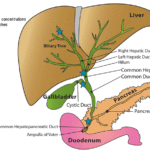
Studies show that healthy bile flow improves thyroid function, boosts metabolism, and can even accelerate weight loss. When it comes to thyroid function, it is estimated that hypothyroidism is 7 times more likely in people with reduced bile flow. Thyroid hormones relax the sphincter of Oddi, which controls the flow of bile into the small intestine. So if your thyroid and hormone levels are low, the sphincter tenses up and less bile can pass. This increases the risk of gallstones and lowers detoxification and emulsification of fat.
Unfortunately, our bile becomes sluggish and less efficient as we age. This is one of the reasons why bowel deficiency is especially common for people over 60. This often happens when there’s not enough bile to neutralize the chyme when it’s coming out, and now the body thinks it needs to reduce the production of hydrochloric acid. So often in these cases the stomach isn’t producing too much acid, but too little.
In addition to being able to neutralize the chyme in the body, bile also breaks down fats. These fats are needed to make hormones and to absorb the fat-soluble vitamins (A, E, D, and K). If the bile becomes sluggish or sludgy, toxins can be recirculated and then other pathways can become clogged.
Symptoms of low-quality bile
Low-quality bile is a common health problem, especially in older individuals. Because bile is costly to make, the body tends to recycle it. As it continues to be recycled, it becomes stagnant and toxins can be reabsorbed back into the body more easily. The following symptoms may result when your bile is stagnant and sluggish:
- Nausea
- Light-colored or floating stools
- Queasiness after a fatty meal
- Inability to lose weight
- Dry skin and hair
- Constipation
- Constant feeling of fullness
- Headache over the eyes
- Bloating or gas
- Sensitivities to chemicals
Along with considering these symptoms, I also use ZYTO technology to help me determine whether drainage pathways are clogged and bile is stagnant. If I see that the detoxification system and gastrointestinal system show up as out of range on a ZYTO bioscan, and I also see that liver and gallbladder are out of range, this can indicate that these pathways need some support to drain properly.
Try these natural remedies to increase bile flow
If any of the above symptoms and issues sound familiar to you, there are a number of natural remedies available to help you increase bile flow. Below are the tools I recommend using to de-sludge your bile for better health.
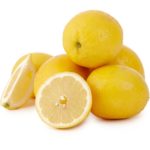 Lemon water
Lemon water
If you choose just one thing from this list, I would highly recommend drinking lemon water every morning. Because you are detoxifying all night long, you are dehydrated, toxic, and very acidic when you wake up. Using organic lemon juice with about 16 ounces of filtered, room-temperature water first thing in the morning helps flush the liver and the kidneys and alkalizes & hydrates the body. And then I recommend waiting about 30 minutes after drinking that before having your morning cup of coffee or tea.
Ox bile (bile salts)
Ox bile or bile salts are often recommended for those with low bile production or no gallbladder. Basically, you need to be taking bile salts if you don’t have a gallbladder. Taking these with food helps with the emulsification of fats.
Bitter foods
Though they aren’t very pleasant to taste, bitter foods help stimulate the bile and promote digestion. Fennel is in this group, and in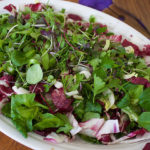 many countries, people eat this prior to a meal or after a meal. Along with bitter foods, there are also bitters you can buy in liquid form.
many countries, people eat this prior to a meal or after a meal. Along with bitter foods, there are also bitters you can buy in liquid form.
Beet root
Beet root is a rich source of a plant compound betaine, which helps to thin the bile. It also can help prevent the formation of gallstones.
Choline
Choline helps you break down and digest fat. So if you have no gallbladder or have been diagnosed with non-alcoholic fatty liver, choline is a good supplement to take. It’s also involved in many other processes such as lipid transport, liver repair, nerve conductivity, brain development, and cognition. Sources of choline in food are beef, almonds, garlic, flour, navy beans, and amaranth.
Taurine
Taurine aids detoxification, promotes increased bile acid production, and reduces cholesterol levels in the blood and the liver. A lot of vegans and vegetarians are typically deficient in taurine because it is derived from the organ meats and other animal tissues.
Pancreatic lipase
Produced in the pancreas, pancreatic lipase helps break down fats as a digestive enzyme. Supplementing with this enzyme can be helpful if you don’t have a gallbladder.
Coffee enemas
Coffee enemas are used to help detoxify the body and open up the bile duct system. It’s different than a regular enema because it  flushes the stagnant bile from the liver and the gallbladder. These enemas work because they go straight to the liver and help detoxify it. And it actually shortens the time it takes for the blood to circulate through the liver from about 6 minutes to about 3, which provides many detoxification benefits.
flushes the stagnant bile from the liver and the gallbladder. These enemas work because they go straight to the liver and help detoxify it. And it actually shortens the time it takes for the blood to circulate through the liver from about 6 minutes to about 3, which provides many detoxification benefits.
Castor oil packing
Castor oil packing is a great alternative to coffee enemas because it is very drawing. It can be very effective at cleansing the bile portion of the liver and gallbladder.
To do castor oil packing, follow these steps:
- Use hexane-free organic castor oil
- Essential oils such as lemon, ginger, grapefruit, peppermint, orange, or bergamot can be added for additional benefit.
- Put the mixture over your liver and gallbladder area, which is right under the rib cage on the right side.
- Cover it with a cloth and put a plastic wrap around to hold it in place.
- Put a heating pad on top, and keep it on for 30 minutes or longer
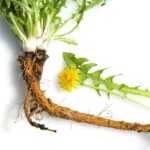 Dandelion root
Dandelion root
In addition to assisting with bile production and movement, dandelion root contains flavonoids that help flush toxins. It also helps with kidney drainage and liver decongestion. The root part of it is typically used, but eating the greens can actually help with bile production as well.
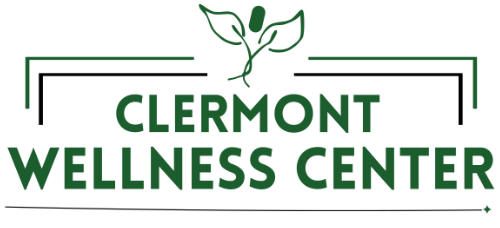
Tina, this is awesome information that i never knew! I don’t have a gallbladder and for years been struggling, anyway i just printed this off and will try your suggestions. I tried to call but i think there was something wrong with the connection. Oh BTW this is Kim your Nature’s Plus inside rep> LOL
Hello and thanks for the webinar on youtube.. Was curious to know out of all the liver increasing bile protocols which one’s have patients reported the best benefits from?? I would love to do the lemon water but I seem to have histamine issues which who knows maybe from the liver not functioning well..
Client needs vary depending on individual health issues. I have several product options and offer customized programs based on each person’s needs. I would recommend finding a health or wellness coach near you or I would be happy to provide a phone consultation. You can reach me at 352-243-3588 to schedule an appointment if you would like.